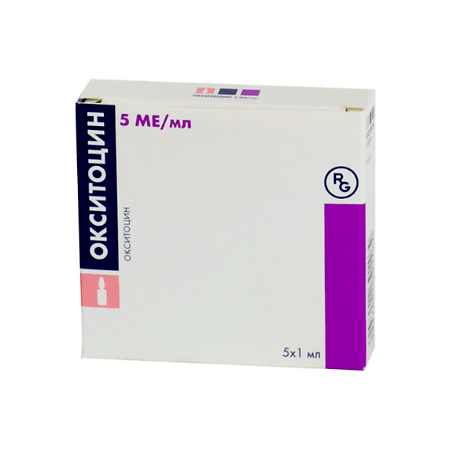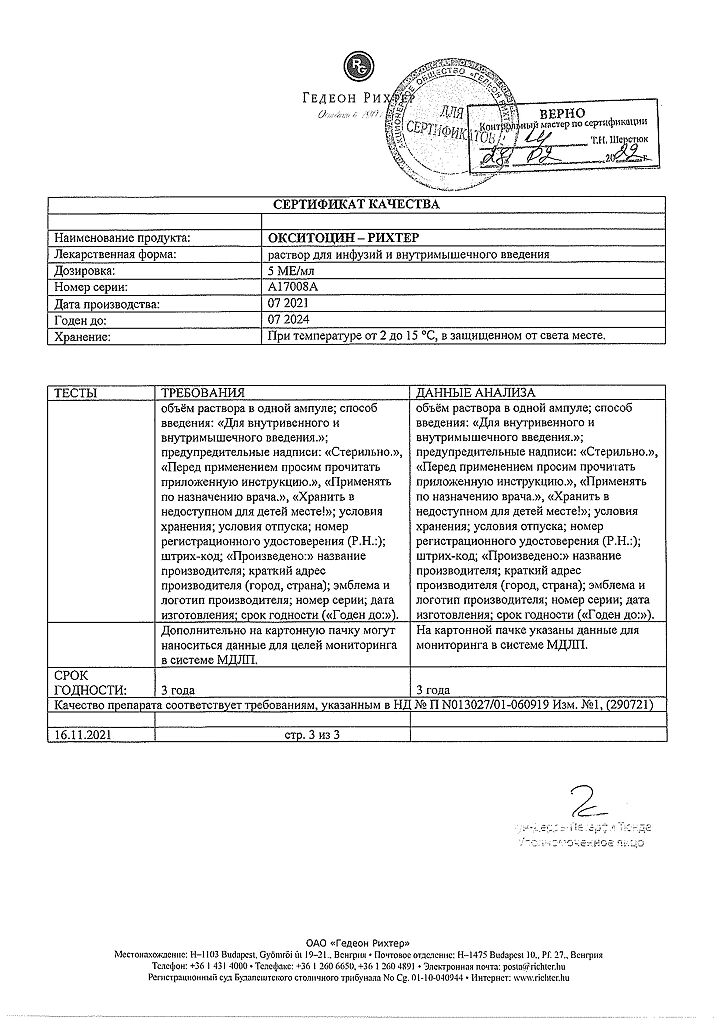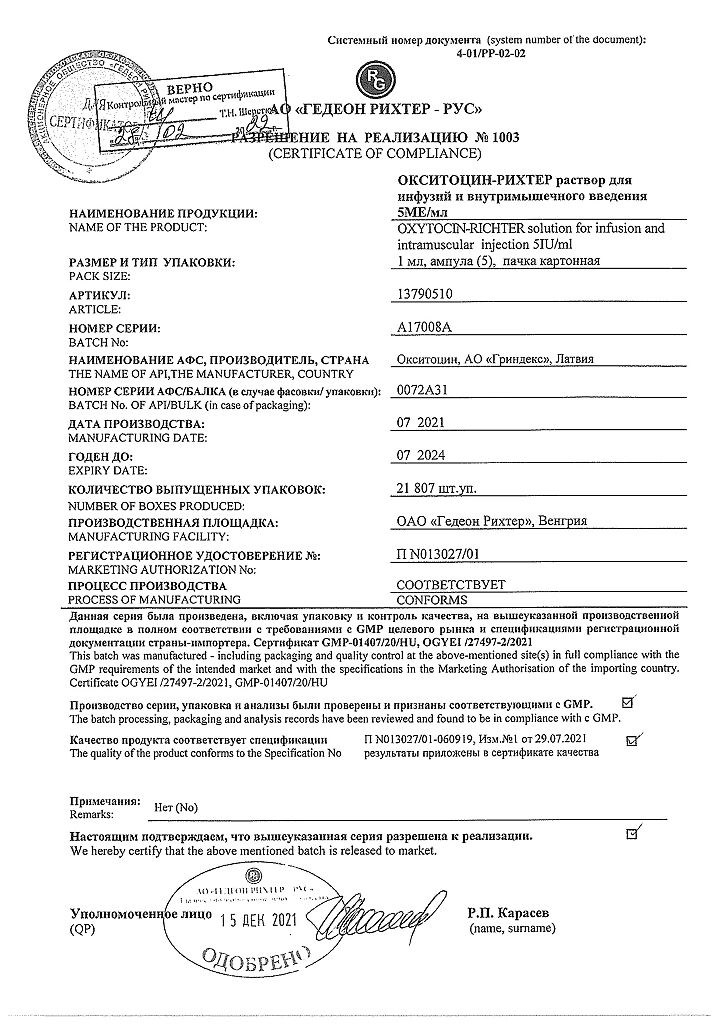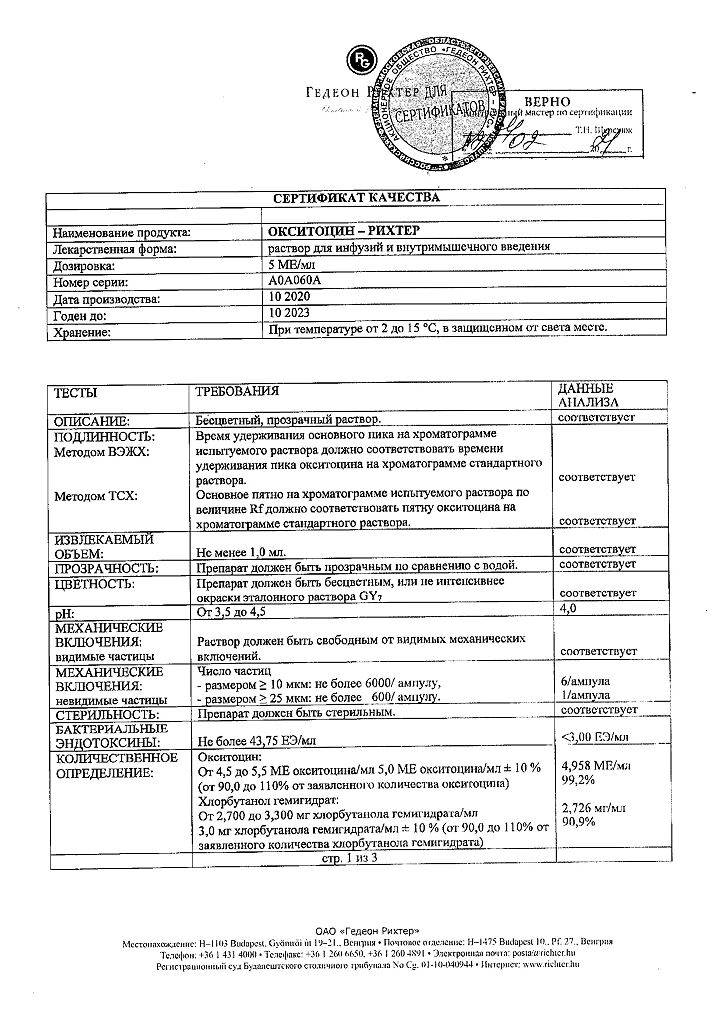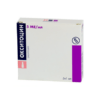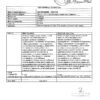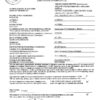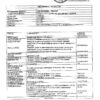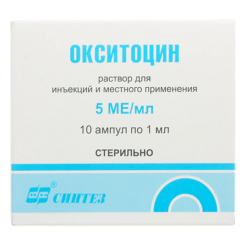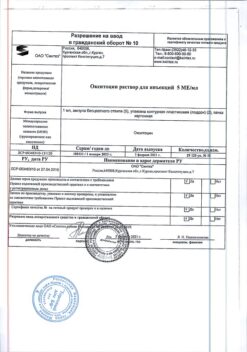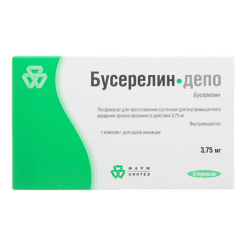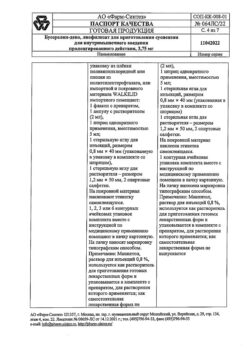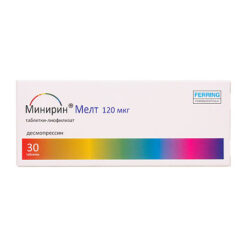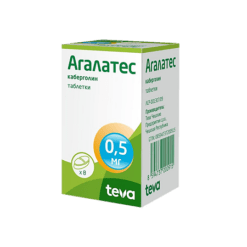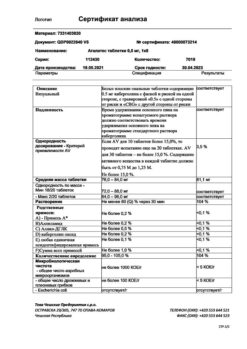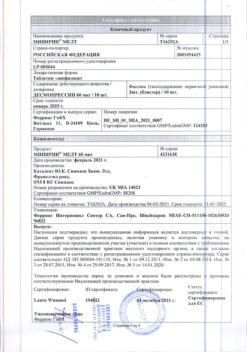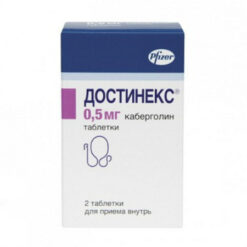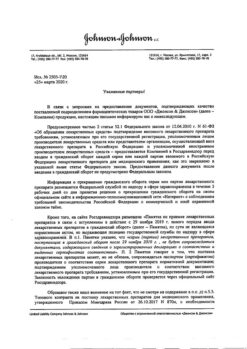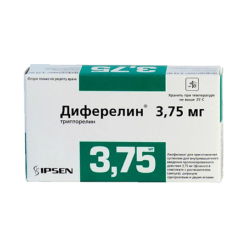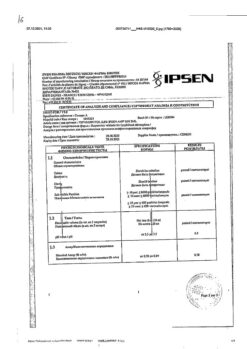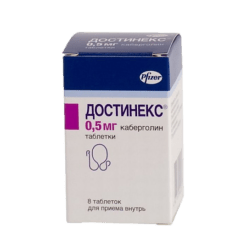No products in the cart.
Oxytocin-Richter, 5 me/ml 1 ml 5 pcs
€2.76 €2.51
Out of stock
(E-mail when Stock is available)
Description
Oxytocin increases the permeability of myometrial cell membranes to ions, increases its excitability and causes and enhances uterine smooth muscle contractions.
Pharmacodynamics
Stimulates lactation by promoting contraction of myoepithelial cells of mammary gland alveoli.
Indications
Indications
Induction of labor during post-term pregnancy;
management of labor in breech presentation, hypotension or atony of the uterus after childbirth, abortion (including termination of long-term pregnancy);
excitation and stimulation of labor with premature rupture of amniotic fluid, with primary or secondary labor weakness;
caesarean section (during the operation);
lactostasis in the early postpartum period, painful premenstrual syndrome accompanied by edema, weight gain.
Pharmacological effect
Pharmacological effect
Oxytocin increases the permeability of myometrial cell membranes for ions, increases its excitability and causes and enhances contractions of the smooth muscles of the uterus.
Pharmacodynamics
Stimulates lactation by promoting the contraction of myoepithelial cells in the alveoli of the mammary glands.
Special instructions
Special instructions
Before starting to use oxytocin, the expected beneficial effect of therapy should be compared with the possibility, although rare, of the development of hypertension and uterine tetany.
Until the fetal head is inserted into the pelvic inlet, oxytocin cannot be used to induce labor.
Every patient receiving intravenous oxytocin should be hospitalized under the constant supervision of experienced professionals who are familiar with the drug and recognized as skilled in recognizing complications. Immediate, if necessary, assistance from a medical specialist must be provided.
During use of the drug, uterine contractions, cardiac activity of the mother and fetus, and blood pressure of the woman in labor should be constantly monitored to avoid complications. If there are signs of uterine hyperactivity, oxytocin should be stopped immediately; As a result, uterine contractions caused by the drug usually subside soon.
When used adequately, oxytocin causes uterine contractions similar to spontaneous labor. Excessive stimulation of the uterus if the drug is used incorrectly is dangerous for both the mother and the fetus. Even with adequate use of the drug and appropriate monitoring, hypertensive uterine contractions occur with increased sensitivity of the uterus to oxytocin.
The risk of developing afibrinogenemia and increased blood loss should be taken into account.
There are cases of death of a woman in labor as a result of hypersensitivity reactions, subarachnoid hemorrhage, uterine rupture and fetal death for various reasons associated with parenteral administration of the drug for induction of labor and stimulation in the first and second stages of labor.
As a result of the antidiuretic effect of oxytocin, overhydration may develop, especially when using a constant infusion of oxytocin and ingesting liquids.
The drug can be diluted in solutions of sodium lactate, sodium chlorate and glucose. The prepared solution should be used within the first 8 hours after preparation. Compatibility studies were carried out with 500 ml infusions.
Active ingredient
Active ingredient
Oxytocin
Composition
Composition
Active ingredient:
oxytocin;
Excipients:
glacial acetic acid;
chlorobutanol hemihydrate;
ethanol (96%);
water for injections;
Pregnancy
Pregnancy
In the first trimester of pregnancy, oxytocin is used only for spontaneous or induced abortions.
Numerous data on the use of oxytocin, its chemical structure and pharmacological properties indicate that, if the instructions for use are followed, oxytocin does not affect the formation of fetal malformations.
Passes into breast milk in small quantities.
When using the drug to stop uterine bleeding, breastfeeding can be started only after completing the course of treatment with oxytocin.
Contraindications
Contraindications
Hypersensitivity, clinically narrow pelvis, abnormal fetal position, complete placenta previa, threat of uterine rupture.
Side Effects
Side Effects
Nausea, vomiting, arrhythmia, incl. in the fetus, bradycardia (maternal and fetal); hypertension and subarachnoid hemorrhage or hypotension and shock; water retention (before poisoning) – with prolonged intravenous administration; allergic reactions.
Interaction
Interaction
When oxytocin is administered 3-4 hours after the use of vasoconstrictors together with caudal anesthesia, severe arterial hypertension is possible.
During anesthesia with cyclopropane and halothane, the cardiovascular effect of oxytocin may change with the unexpected development of arterial hypotension, sinus bradycardia and atrioventricular rhythm in a woman in labor during anesthesia.
Overdose
Overdose
Symptoms depend mainly on the degree of uterine hyperactivity, regardless of the presence of hypersensitivity to the drug.
Hyperstimulation with hypertonic and tetanic contractions or with a baseline tone of ≥15-20 mm aq. Art. between two contractions leads to erratic labor, rupture of the body or cervix, vagina, bleeding in the postpartum period, uteroplacental insufficiency, fetal bradycardia, hypoxia, hypercapnia, compression, birth injuries or death.
Overhydration with convulsions as a result of the antidiuretic effect of oxytocin is a serious complication and develops with prolonged administration of large doses (40-50 ml/min).
Treatment of overhydration: withdrawal of oxytocin, restriction of fluid intake, use of diuretics to increase diuresis, intravenous administration of hypertonic saline, correction of electrolyte imbalances, control of seizures with appropriate doses of barbiturates, and provision of professional care for the patient in a coma.
Storage conditions
Storage conditions
At a temperature of 1–5 °C.
Shelf life
Shelf life
3 years
Manufacturer
Manufacturer
Gedeon Richter, Hungary
Additional information
| Shelf life | 3 years |
|---|---|
| Conditions of storage | At a temperature of 1-5 °C. |
| Manufacturer | Gedeon Richter, Hungary |
| Medication form | Infusion and intravenous solution |
| Brand | Gedeon Richter |
Other forms…
Related products
Buy Oxytocin-Richter, 5 me/ml 1 ml 5 pcs with delivery to USA, UK, Europe and over 120 other countries.

